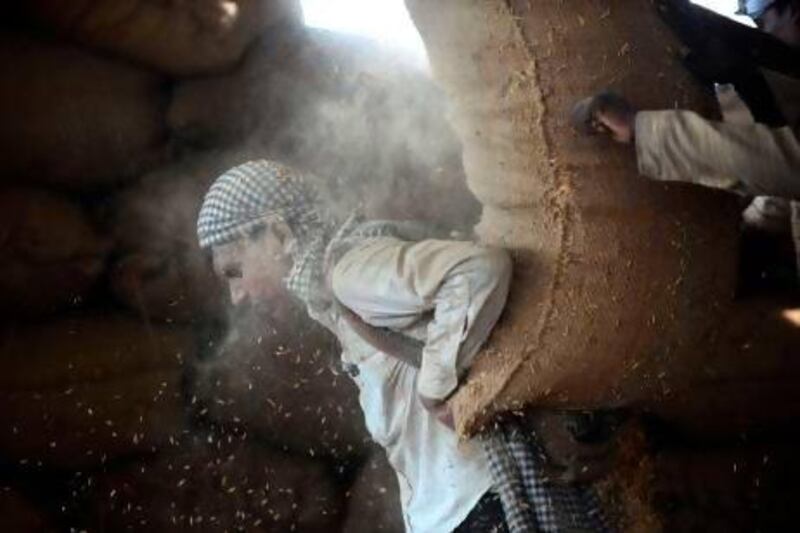NEW DELHI // India can afford to fund an ambitious food security bill that will push the cost of subsidies to more than 1 trillion rupees (Dh55 billion) a year, the finance minister said yesterday.
P Chidambaram spoke a day after the bill moved past the lower house of the parliament. The bill, which is expected to easily pass the upper house and become law, has been the subject of fierce debate since it was introduced in December 2011.
After hours of deliberation on Monday, the house passed the bill, which plans to provide nearly 70 per cent of India's population with subsidised grain. The bill is expected to add an additional 250bn rupees to the government's already outsize annual food subsidy of 900bn rupees.
"After providing for the food-security bill, we will remain within the limit I have set for myself in the budget," Mr Chidambaram said yesterday.
The worries over financing the bill sank financial markets. The Sensex in Mumbai closed 590 points down, while the rupee hit a record low of 66 to the US dollar.
If the bill becomes law it will expand the food subsidy net to a total of 800 million people, up from the present 218 million people, and "wipe out hunger and malnutrition", said Sonia Gandhi, president of the ruling Congress party. Ms Gandhi, who was rushed to hospital from parliament late Monday evening, was discharged yesterday. A Congress party official said that she was suffering from viral fever.
Much of the criticism of the bill was reserved for its timing. The ruling coalition - headed by the Congress party - has been accused of pushing through this expensive populist measure in the run-up to the general elections in May, just as it pushed through a costly rural employment scheme before the 2009 elections.
"This is not a food security bill," Murli Manohar Joshi, a senior leader of the opposition Bharatiya Janata Party said, "it is a vote security bill."
Critics also say India would be hard-pressed to accommodate the extra expenditure, at a time when it was struggling with a large fiscal deficit, slowing economic growth and high inflation.
India's fiscal deficit, in 2012-13, was 5.2 per cent of gross domestic product. In June, India's food inflation stood at 9.74 per cent, and the government has lowered its estimate of economic growth from 6.7 per cent to 5.5 per cent.
"Such a large outlay at this point in time would definitely have a negative impact on the fiscal deficit," Kris Gopalakrishnan, the president of the Confederation of Indian Industry, an organisation of business leaders, said. "This needs to be managed."
However, Mr Gopalakrishnan admitted that "government intervention to provide nutritious food is essential" in a country that is home to 40 per cent of the world's malnourished children.
Harsh Mander, an activist who works to alleviate mass hunger, said in an op-ed in the Mint newspaper that critics of the food security bill ought to be thinking about "the costs of not investing in the better nourishment of millions of our people".
To manage the fiscal deficit, Mr Mander said, India should raise taxes. "Growth cannot be sustained much longer on the thin shoulders of hungry people," Mr Mander wrote.
Sridhar Radhakrishnan, a policy adviser to the Kerala state government, said that while the objective of feeding the poor was admirable, he worried about the bill's implementation.
The existing public distribution system, through which this subsidised grain will reach people, has worked in some states but has failed in others, said Mr Radhakrishnan.
The failures "highlight corruption, the lack of proper procurement, and not having facilities to store [grain] or a mechanism of foolproof delivery", Mr Radhakrishnan said.
With the government becoming an even bigger purchaser of food grains, India's agricultural community, particularly small farmers, is a significant beneficiary of the food security bill.
Chengal Reddy, the secretary general of the Consortium of Indian Farmers' Association, said that, "regardless of how much it costs, [the bill] is a good policy".
But Mr Reddy added that India's farmers would be better served if the government set policy to expand productivity as well as the range of agricultural products.
India has roughly 140 million hectares of arable land, around 55 per cent of which depends on rain for irrigation. As a result of lack of investment in the agricultural sector, farm productivity is low. India produces 3,000 kilograms of rice per hectare, but China produces double that.
[ ssubramanian@thenational.ae ]
sbhattacharya@thenational.ae
twitter: For breaking news from the Gulf, the Middle East and around the globe follow The National World. Follow us





